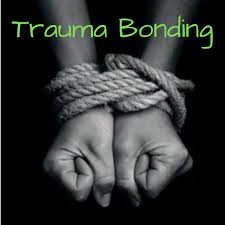True Love or Trauma Bond?
Everyone wants to be loved, liked, celebrated, and accepted no matter what. To have a partner that is supportive, kind, loyal, and caring. To have somebody who chooses you every day, validates your worth and is consistently present.
Now picture this: You finally meet your soulmate, your “person”, the man/woman of your dreams. The person who exceeds all the qualities you could only have wished for and you are certain that this love only happens once in a lifetime. There is an instant connection and the relationship is romantic and passionate. And then things begin to change. Your partner begins to display behaviour where they are really “nice” and “wonderful” to you most of the time, however is also emotionally and/or physically abusive. They give you compliments, presents and kind comments on some occasions, but also criticise, terrorise, and abuse you on other occasions.
Is this still true love, or am I in a trauma bond?!
True love can be described as a strong and lasting affection between spouses or lovers who are in a happy, passionate and fulfilling relationship. The love shared between two people continuously grows as they get to know each other and the strength of the connection increases over time. Each partner is committed to the act of building one another up by encouraging and understanding, rather than shaming and judging. True love usually begins off slow and steady, where the chemistry is strong at first and gradually grows fainter over time.
On the other hand, a trauma bond is characterised by an imbalance of power, high intensity, and an unpredictable atmosphere, rapidly shifting between periods of cruelty and tenderness. It is the process in which a person begins to confuse abusive behaviour for love. A trauma bond can begin strong and increase in strength as time goes on. The attachment may feel gripping and magnetic, and an individual may feel unable to escape the pull of the other person.
A trauma bond can be thought of as running on a never-ending hamster wheel, where periods of intermittent reinforcement (love, promises and kindness) are combined with periods of physical, emotional and psychological abuse. The more you want to get off the hamster wheel, the more you feel confined to the wheel and trapped in the movement to keep running. The cycle becomes toxic as the need to regain the feelings of infatuation that were felt at the beginning of the relationship, leads the victim to repeatedly forgive their partner in order to return to the good feelings associated with the relationship.
A trauma bond does not only occur within a romantic relationship, but can also form between family members, friends and co-workers. It is more likely that a person who has a history of or exposure to abuse will form a trauma bond with another person, because of their emotional or psychological need which hasn’t been met in the past. Thus, this trauma bonded relationship provides a way for this need to be met, even though it is not being met appropriately.
Symptoms of trauma bonding
If you are reading this and wondering if your relationship is true love or a trauma bond, these symptoms of trauma bonding may help you to decide:
- You know that your relationship is deceptive and toxic, however you feel that you can’t leave your partner, because they are the only one who can fulfil your needs.
- You take responsibility or blame yourself for the bad things that happen in your partner’s life and always feel the need to fix them.
- You believe that you are “the crazy one” by always questioning and doubting yourself.
- You feel powerless over your future.
- You are afraid to say “no” or stand up for what you want because you don’t want your partner to think you are mean, rigid, or inflexible.
- Despite the sacrifices that you have made for the relationship, you feel that you haven’t contributed enough.
- You are continuously loyal and are always trying to please your partner, even though this is only returned with pain.
- You lie about or brush off your partner’s behaviour to your family/friends.
Realising that you are in a trauma bond is definitely not an easy pill to swallow. However, it is important for you to know that you can break free from the ropes that are keeping you in the trauma bond and take back your power, hope, and self-belief!
Here are some tips to break free from the trauma bond:
- Separate from the person completely. Ignore any messages, calls or other means that they try to reach you with.
- Live in the moment. Recognise how trapped you feel, and make a commitment to pay attention to your present emotions.
- Create a support system. This should consist of trusted individuals who understand and support your goals moving forward.
- Invest in your own self-care. Make decisions that build you up rather than tear you down. Try to not beat yourself up over past decisions, and instead make decisions that support your own interests.
- Learn to grieve the past relationship. Identify and understand the aspects that made the relationship toxic. Say goodbye and let it go.
- Build your life and make healthy connections. Start investing in your own dreams and hopes for the future. Give time to the things that bring you joy and happiness.

I have a passion for working with people and love to interact and meet new people. I enjoy working with various ages of individuals from children and teenagers, through to young and older adults. I have a compassionate heart towards those who are suffering and am always looking to find ways to assist an individual in any way I can. I believe that life is a journey and not a destination, with a road that is ought to be filled with good and bad bumps along the way. However, I think that with the right support systems, understanding, and acceptance a person can work through and begin to achieve anything that they set their minds to on this journey of life.
“The journey of a thousand miles begins with a single step”
mapstonea@gmail.com


